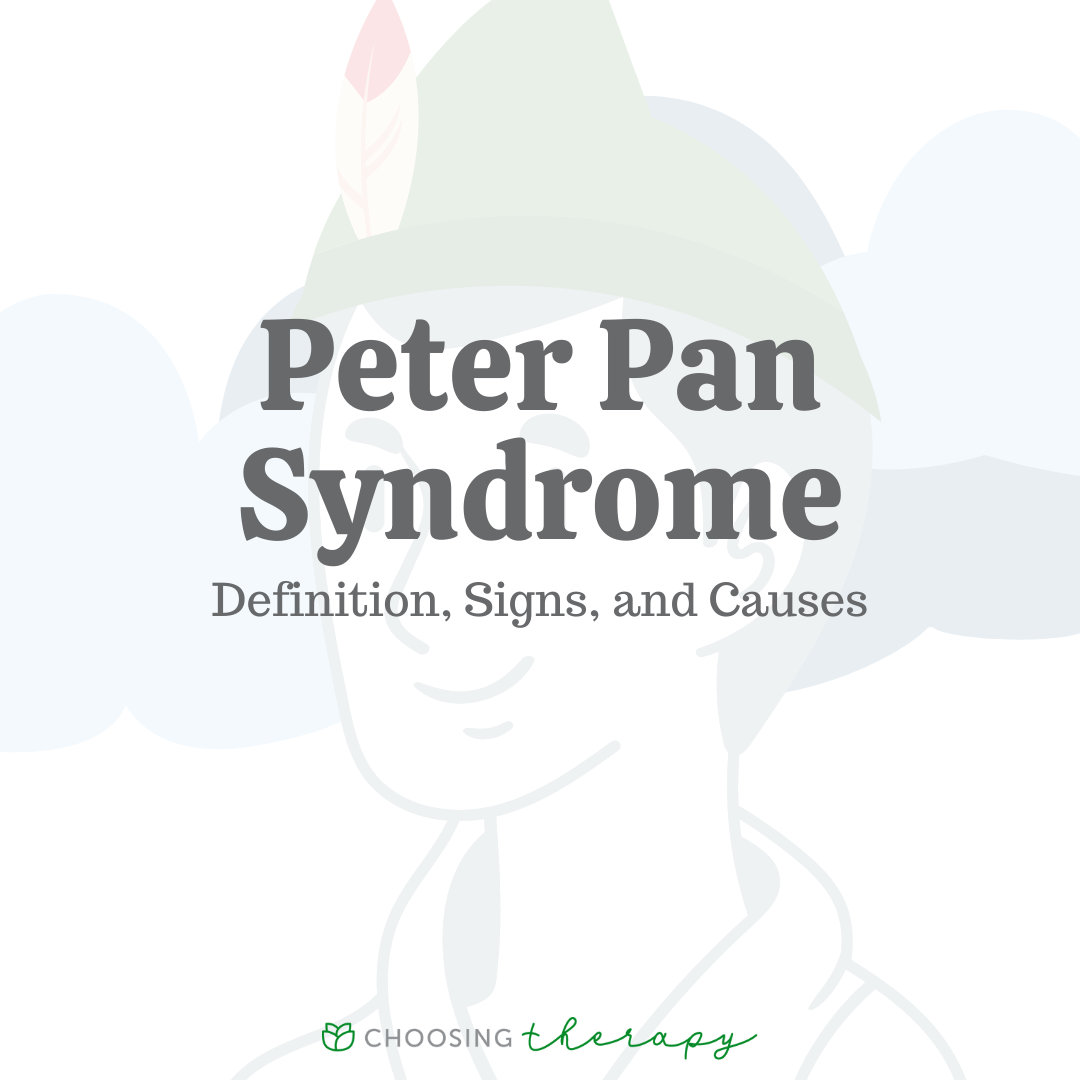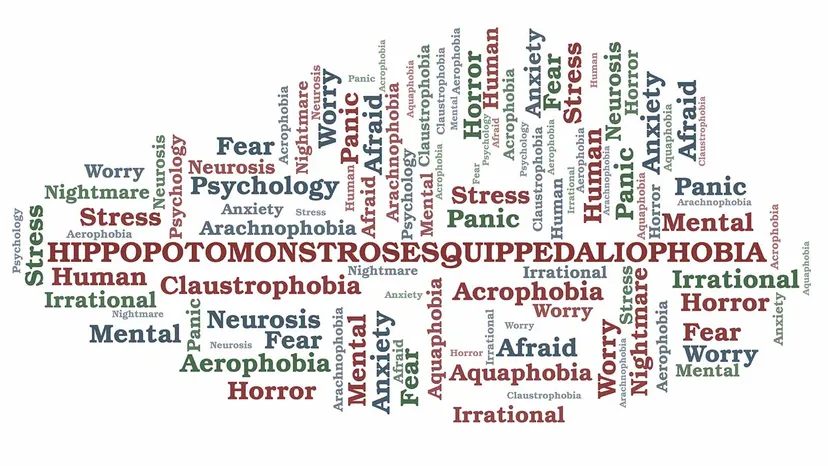Peter Pan Syndrome
Peter Pan syndrome is a disorder in which a person fails to reach adulthood. As they mature physically, they adopt childish tendencies instead of taking on adult responsibilities. If you or a loved one is experiencing this, you can learn what causes it, the symptoms, and how to overcome your reluctance to grow up.
What is Peter Pan syndrome?
Although it is not a recognized disorder, the phrase Peter Pan Syndrome (PPS) is used in popular psychology to describe an adult struggling with growing up. The word originates from J.M. Barrie’s 1902 work about the magical child who never ages, Peter Pan.
People with this syndrome exhibit several social behaviors, beliefs, and characteristics considered immature. Most of the time, people may have problems with dedication, keeping a job, doing housework, fulfilling obligations and gaining a clear sense of purpose in life. Behaviors associated with the syndrome can affect people of any sex or gender, although it is more common in cisgender men and those assigned male at birth (AMAB).
These people, like Peter Pan, struggle with being unable to succeed or refusing to grow up. They tend to be self-centered and constantly avoid commitments and responsibilities in favor of the adult responsibilities that most people undertake.
What are the symptoms of Peter Pan syndrome?
There is no official psychiatric diagnosis for Peter Pan syndrome. On the other hand, people who use this phrase usually describe symptoms such as:
- Unstable emotions
- Avoidance of responsibility
- Rely on a parent or partner to make judgments
- Fear of being alone
- Difficulty keeping promises
- You find it difficult to accept criticism from others
- Prioritizes the enjoyment of activities over the obligations of adults
- Struggles to get or keep a job
- Make friends with children, not with people in their age group
- Changing partners when the partnership becomes too severe or intimate
What Causes Peter Pan Syndrome?
Peter Pan syndrome is a recently discovered syndrome without a clinically recognized diagnosis. These factors have led to a need for more research on the subject. Below are a few things that may contribute to the development of Peter Pan syndrome:
Feeling Alone: Those suffering from Peter Pan syndrome may fear being alone. As a result, they are constantly looking for guardians, usually romantic partners.
Gender Roles: Women are often forced to perform emotional labor, care for the home, and raise children. It would be easier for their male partners to give up these responsibilities and delay adulthood.
Fear of commitment: People suffering from Peter Pan syndrome often experience unstable relationships. They may start dating younger and younger partners, believing that the former will be less invested and have less hope for the future.
Parenting: Children whose parents are overprotective may become overly dependent on them. It is possible that these children do not acquire the fundamental abilities needed for adulthood, resulting in Peter Pan syndrome.
Mental health diagnoses: According to some studies, men with Peter Pan syndrome may also have personality problems. For example, according to a study, Peter Pan syndrome often occurs in complex family systems where the female partner is sad, and the male partner has a narcissistic personality.
Anxiety: Being an adult can be difficult for some people. Worrying about your ability to find a job, make a living, or achieve other success goals is normal. Some people may refuse to grow up when there is a practical way out of these obligations, such as a parent or spouse taking over the day-to-day tasks.
An interest in “childish” things like comic books or dolls does not lead to Peter Pan syndrome. Instead, this illness is associated more with an unwillingness to take responsibility and build reciprocal relationships.
How are relationships affected by Peter Pan syndrome?
Peter Pan syndrome can sometimes affect relationships in many ways.
You might be too involved in your adult child’s life if you’re a parent. You may clean up after them, handle their finances, or get in the way of their social life. However, if you have Peter Pan syndrome, you might rely on other people excessively. Is someone handling tasks that you could perform yourself? Do they resolve your disputes? If so, you may be struggling to move into adulthood.
How to treat Peter Pan Syndrome
As soon as you notice that you or someone you care about exhibits symptoms of Peter Pan syndrome, you should discover the underlying cause. Once you have diagnosed this, you can move on on your own, ask loved ones for help, or choose a therapist to help you overcome the disorder.
A person can overcome this disorder by acquiring the life skills to care for oneself. Therapists help men with Peter Pan syndrome using a five-step process that goes like this:
- Connects with them to promote communication, respect and trust
- Learn about their powerful habits and the motivation behind them
- Gives them the success-oriented training needed to overcome obstacles and gain experience
- Follow the steps until they have the skills and confidence to achieve independence.
- Men learn from coaches the hard and soft skills they will need for the rest of their lives.
They can acquire cleaning, cooking and basic maintenance skills. In addition to planning and preparing nutritious meals, practicing good hygiene and understanding the value of physical fitness, they will also learn to take care of themselves. Children will acquire goal-setting, job search and financial management skills.
Patients may gain social skills such as effective communication and dispute resolution and emotional abilities such as stress management, anger management and emotion regulation. Men work closely with therapists and coaches to determine which skills will most benefit them from acquiring.
Therapy For Peter Pan Syndrome
People around the person who never grew up often suffer. The person’s companion may feel exhausted from doing all the household chores. The person’s parents may withdraw funds from their retirement plans to continue providing financial support.
People with Peter Pan syndrome may not consider their symptoms unpleasant. Many people wait until they are cut off from support systems or until their symptoms threaten their relationships. Families experiencing Peter Pan Syndrome in a loved one should know that setting firm boundaries can encourage the person to seek help.
The family as a whole can gain a better understanding of the dynamics at hand through family therapy or couples counseling. They can discuss their role in the partnership and strive for stronger, more harmonious connections in therapy. A Better4U therapist can help a client understand why they don’t want to grow up, address underlying issues such as trauma, and create a strategy for transitioning to adulthood through individual counseling. Developing relationships, finding a job, and becoming self-sufficient can seem like a huge task. A competent therapist can help people gradually improve their lives by breaking down these tasks into manageable steps.










